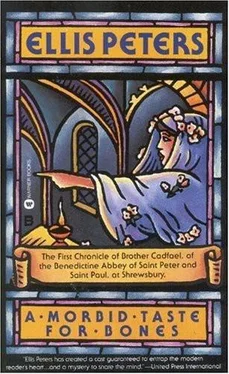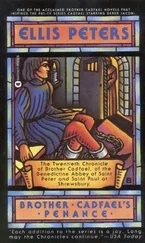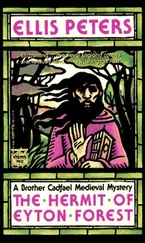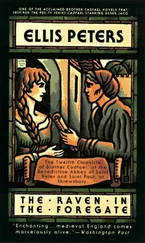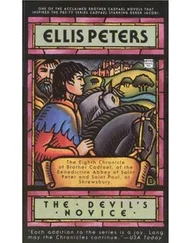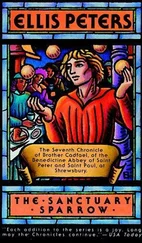“Brother Cadfael,” she said, without taking her eyes from Robert’s face, “stand by me now and make my words plain to the reverend prior, for I have a prayer to him for my father’s sake.”
Rhisiart was there at her back, not coffined, only swathed and shrouded in white linen, every line of the body and face standing clear under the tight wrappings, in a cradle of leafy branches, carried on a wooden bier. All those dark, secret Welsh eyes of the men who bore him glowed like little lamps about a catafalque, betraying nothing, seeing everything. And the girl was so young, and so solitary. Prior Robert, even in his assured situation, was uneasy. He may have been moved.
“Make your prayer, daughter,” he said.
“I have heard that you intend to watch three nights in reverence to Saint Winifred, before you take her hence with you. I ask that for the ease of my father’s soul, if he has offended against her, which was never his intent, he may be allowed to be those three nights before her altar, in the care of those who keep watch. I ask that they will spare one prayer for forgiveness and rest to his soul, one only, in a long night of prayer. Is that too much to ask?”
“It is a fair asking,” said Robert, “from a loyal daughter.” And after all, he came of a noble family, and knew how to value the ties of blood and birth, and he was not all falsity.
“I hope for a sign of grace,” said Sioned, “all the more if you approve me.”
There was no way that such a request could do anything but add lustre and glory to his reputation. His opponent’s heiress and only child came asking his countenance and patronage. He was more than gratified, he was charmed. He gave his consent graciously, aware of more pairs of Gwytherin eyes watching him than belonged to Rhisiart’s bearers. Scattered though the households were, apart from the villein community that fanned as one family, the woods were full of eyes now wherever the strangers went. A pity they had not kept as close a watch on Rhisiart when he was man alive!
They installed his green bier on the trestles before the altar, beside the reliquary that awaited Saint Winifred’s bones. The altar was small and plain, the bier almost dwarfed it, and the light that came in through the narrow east window barely illuminated the scene even by morning sunlight. Prior Robert had brought altar-cloths in the chest, and with these the trestles were draped. There the party from Rhisiart’s hall left their lord lying in state, and quietly withdrew on the way home.
“In the morning,” said Sioned, before she went with them, “I shall come to say my thanks to those who have asked grace for my father during the night. And so I shall do each morning, before we bury him.”
She made the reverence due to Prior Robert, and went away without another word, without so much as a glance at Brother Cadfael, drawing the veil close round her face.
So far, so good! Robert’s vanity and self-interest, if not his compunction, had assured her of her chance, it remained to be seen what would come of it. The order of their watches had been decreed by Robert himself, in consultation with no one but Father Huw, who wished to be the first to spend the night opening his heart to the saint’s influence, if she pleased to make her presence known. His partner was Brother Jerome, of whose obsequious attendance the prior occasionally grew weary, and Cadfael was thankful for the accidental choice that suited him best. That first morning, at least, no one would know what to expect. After that the rest would have due warning, but surely no way of evading the issue.
In the morning, when they went to the chapel, it was to find a fair number of the inhabitants of Gwytherin already gathered there, though unobtrusively, lurking in the edges of the woods and under the fragrant shadow of the hawthorn hedges. Only when the prior and his companions entered the chapel did the villagers emerge silently from cover and gather close, and the first of them to draw near was Sioned, with Annest at her elbow. Way was opened for the two girls, and the people of Gwytherin closed in after them, filling the doorway of the chapel and blocking off the early light, so that only the candles on the altar cast a pale glow over the bier where the dead man lay.
Father Huw got up from his knees somewhat creakily, leaning on the solid wood of the desk till he could get his old legs straightened and working again. From the other desk beside him Jerome rose briskly and supply. Cadfael thought suspiciously of devout watchkeepers who fell asleep as comfortably as possible on their folded arms, but at the moment that was of no importance. He would hardly have expected heaven to open and rain down roses of forgiveness at Jerome’s request, in any case.
“A quiet watch,” said Huw, “and all most calm. I was not visited by any great experience, but such hardly fall to humble parish priests. We have prayed, child, and I trust we have been heard.”
“I am grateful,” said Sioned. “And before you go, will you do one more kindness for me and mine? As you have all been sufferers in this trouble and dissension, will you show your own will to mercy? You have prayed for him, now I ask you to lay your hand, each of you, upon my father’s heart, in token of reassurance and forgiveness.”
The people of Gwytherin, still as trees in the doorway, but live as trees, too, and all eyes as a tree is all leaves, made never a sound, and missed never a move.
“Gladly!” said Father Huw, and stepped to the bier and laid his rough hand gently on the stilled heart, and by the wagging of his beard his lips were again moving in silent intercession. All eyes turned upon Brother Jerome, for Brother Jerome was hesitating.
He did not look greatly disturbed, but he did look evasive. The face he turned upon Sioned was benevolent and sweet, and having bestowed on her the obligatory glance of compassion, he modestly lowered his eyes before her as was prescribed, and turned to look trustfully at Prior Robert.
“Father Huw holds the cure of this parish, and is subject to one discipline, but I to another. The lord Rhisiart surely carried out his religious duties faithfully, and I feel with him. But he died by violence, unconfessed and unshriven, and such a death leaves the health of his soul in doubt. I am not fit to pronounce in this case. I have prayed, but blessing is not for me to dispense without authority. If Prior Robert feels it is justified, and gives me leave, I will gladly do as I am asked.”
Along this devious path Cadfael followed him with some amazement and considerable doubt. If the prior had himself authorised the death, and sent his creature out to accomplish it, Jerome could not have turned the threat back on his superior more neatly. On the other hand, knowing Jerome, this could as well be his way of flattering and courting, at this opportunity as at every other. And if Robert graciously gave his leave, did he suppose that would protect him, as having plainly handed on the guilt and the threat where they truly belonged, and leave him free to touch his victim with impunity? It would have mattered less if Cadfael had firmly believed that the murdered bleed when the murderer touches, but what he believed was very different, simply that the belief was general among most people, and could drive the guilty, when cornered, to terror and confession. That very terror and stress might even produce some small effusion of blood, though he doubted it. He was beginning to think that Jerome doubted it, too.
The watching eyes had changed their quarry, and hung heavily upon the prior. He frowned, and considered gravely for some moments, before he gave judgment. “You may do what she wishes, with a good conscience. She is asking only for forgiveness, which is every man’s to give, not for absolution.”
Читать дальше
